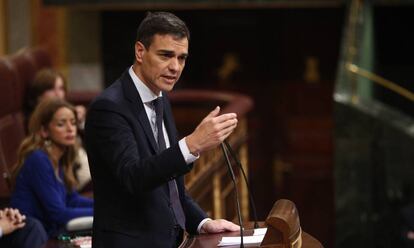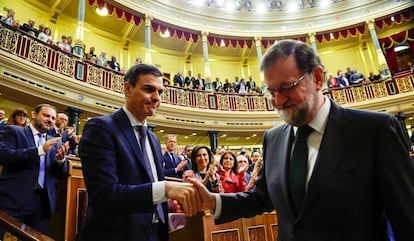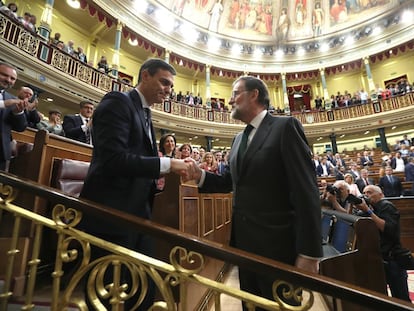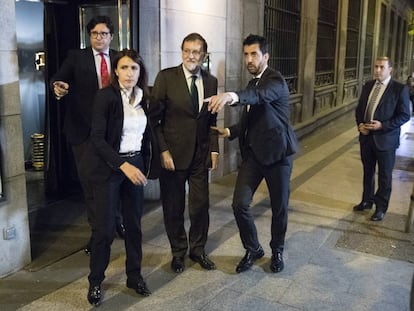Pedro S¨¢nchez becomes the new prime minister of Spain
The leader of the Spanish Socialists will govern the country in a minority after winning a no-confidence motion against Mariano Rajoy with the support of separatist and populist parties


The general secretary of the Socialist Party (PSOE), Pedro S¨¢nchez, became the prime minister of Spain on Friday, after his no-confidence motion filed against Mariano Rajoy of the Popular Party (PP) prospered in Congress.
S¨¢nchez may be sworn in as early as this Saturday
The politician, who today became the first ever to win such a vote in Spain¡¯s democratic era, managed to garner the support of the left-wing Unidos Podemos, the pro-Catalan independence groups PDeCATCatalan and Republican Left (ERC), the Basque Nationalist Party (PNV), the Valencia party Comprom¨ªs, the Basque far-left nationalists of Bildu, and center-left Canary Islands party Nueva Canarias. The motion passed with 180 votes in favor, 169 against, and one abstention. An absolute majority of 176 votes was needed to succeed.
The new prime minister has pledged to respect the budget recently passed by the PP, which needed the support of other parties ¨C including the PNV ¨C for approval. S¨¢nchez has also committed to starting a process of dialogue with parties in favor of Catalan independence, while respecting the Spanish Constitution and the regional Statute, which lays out Catalonia¡¯s autonomous powers.
S¨¢nchez also stated that he was prepared to call a general election, although he has not specified when this would be.

The vote went through after two days of debate in Congress, during which Mariano Rajoy refused to quit in response to his opponent¡¯s offer to withdraw the motion
Rajoy caused a stir during the second half of yesterday¡¯s debate in Congress, after he left the chamber at 2pm and did not return. It later transpired that he spent eight hours in a Madrid restaurant, accompanied by several of his ministers.
This morning, however, he arrived at the debate ahead of the vote to applause from his PP colleagues. In a brief speech, he said that, as a democrat, he accepted the result of the motion, but said he could not accept ¡°what has been done.¡± He said he considered it an honor to have presided over the Spanish government, and that he was leaving behind a situation that was ¡°better than the one I found.¡± He continued: ¡°I hope that my substitute will be able to say the same when the time comes. Thanks to all of you and my party. And to all Spaniards for their understanding and support.¡±
PP parliamentary spokesperson Rafael Hernando said his party would be ¡°unyielding¡± in opposition
Once he had finished addressing Congress, the session was suspended ahead of the vote at 11am.
Rajoy was the first to shake S¨¢nchez¡¯s hand after the vote, amid applause from the deputies who had supported the motion. Politicians from the left-wing anti-austerity group Podemos chanted ¡°Yes we can!¡±
S¨¢nchez then went on to thank all of his 84 deputies in Congress, as well as the party leaders who had supported him, including Pablo Iglesias (Podemos), Aitor Esteban (PNV), Carles Campuzano (PDeCAT) and Joan Tard¨¤ (ERC).
The speaker in Congress, Ana Pastor, will this afternoon communicate the result of the vote to Spain¡¯s King Felipe VI, and the government will present its resignation in accordance with the Spanish Constitution. The king will then sign off on the appointment of S¨¢nchez as prime minister, and this will be published in the Official State Gazette (BOE).
S¨¢nchez may be sworn in as early as this Saturday, and he will then proceed to name the ministers in his Cabinet.
In a highly caustic statement, the PP parliamentary spokesperson, Rafael Hernando, announced ahead of the vote to Congress that his party would be ¡°unyielding¡± in opposition, and he pointed out that the party continues to enjoy a majority in the Senate. Hernando used all of the ammunition at his disposal to discredit the no-confidence motion, describing it as a ¡°manipulation of the [G¨¹rtel] sentence,¡± which found evidence that the PP had run a slush fund from its central headquarters.
Hernando also made references to the turbulence that will be caused by the no-confidence motion at a complicated time for Europe, given the political instability in Italy, not to mention the situation in Catalonia, where regional autonomous powers have been suspended since the unilateral declaration of independence was passed by the regional parliament late last year.
As Rajoy did, Hernando drew attention to the corruption cases that have affected the PSOE, as well as insisting that S¨¢nchez had taken power with the support of ¡°populists¡± and ¡°the old friends of [Basque terrorist group] ETA,¡± who would be propping up his ¡°Frankenstein government,¡± a reference to the wildly differing interests of the groups that have backed S¨¢nchez.
S¨¢nchez has committed to respecting the budget recently passed by the PP
Key to the success of the no-confidence vote was the support of the PNV, which, after supporting Rajoy¡¯s budget just 10 days ago, decided to back the PSOE motion on the basis that keeping the PP in government would not guarantee the stability of Spain.
Events were set into motion after the G¨¹rtel ruling fined the PP more than €245,000 for having benefited from the corrupt network, with judges questioning the credibility of Rajoy¡¯s witness statements in the case. Rajoy made history last year, when he became the first sitting Spanish prime minister to make such an appearance in a criminal trial.
As for S¨¢nchez, this last year has been a surprising one for him. In May of last year he won back the leadership of the PSOE thanks to his victory in primaries, despite having been ousted himself as party chief just months before. Now he is set to head a Spanish government without having won a general election, without even being a deputy in Congress (he resigned so as not to have to vote in the investiture of Mariano Rajoy in 2016), and with just 84 seats in a house where 176 are needed for a majority.
English version by Simon Hunter.
Tu suscripci¨®n se est¨¢ usando en otro dispositivo
?Quieres a?adir otro usuario a tu suscripci¨®n?
Si contin¨²as leyendo en este dispositivo, no se podr¨¢ leer en el otro.
FlechaTu suscripci¨®n se est¨¢ usando en otro dispositivo y solo puedes acceder a EL PA?S desde un dispositivo a la vez.
Si quieres compartir tu cuenta, cambia tu suscripci¨®n a la modalidad Premium, as¨ª podr¨¢s a?adir otro usuario. Cada uno acceder¨¢ con su propia cuenta de email, lo que os permitir¨¢ personalizar vuestra experiencia en EL PA?S.
En el caso de no saber qui¨¦n est¨¢ usando tu cuenta, te recomendamos cambiar tu contrase?a aqu¨ª.
Si decides continuar compartiendo tu cuenta, este mensaje se mostrar¨¢ en tu dispositivo y en el de la otra persona que est¨¢ usando tu cuenta de forma indefinida, afectando a tu experiencia de lectura. Puedes consultar aqu¨ª los t¨¦rminos y condiciones de la suscripci¨®n digital.










































